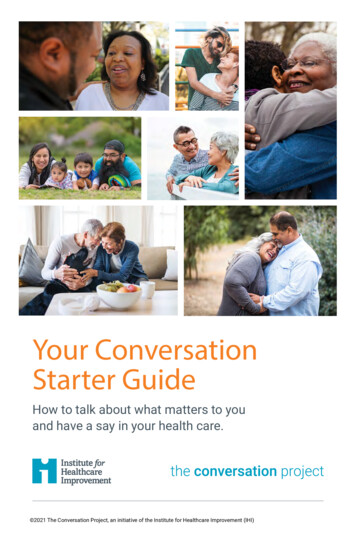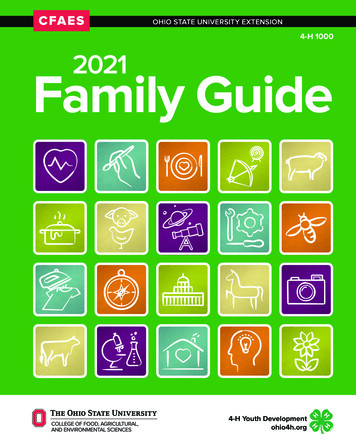
Transcription
Your ConversationStarter GuideHow to talk about what matters to youand have a say in your health care. 2021 The Conversation Project, an initiative of the Institute for Healthcare Improvement (IHI)
We can’t plan for everything. But we can talk aboutwhat is most important — in our life, and in ourhealth care — with those who matter most.Talking with the important people in our life can bring us closer together.It also helps us create the foundation of a care plan that’s right for us —a plan that will be available when the need arises.The Conversation Project wants to help everyone talk about their wishesfor care through the end of life, so those wishes can be understood andrespected. We created this guide to help you start a conversation (and keeptalking) so you can have a say in your health care — today and tomorrow.It’s also important to choose what’s known as a health care proxy, or healthcare advocate — someone who would make health care decisions on yourbehalf if you became unable to voice those decisions yourself. Visit ourGuide to Choosing a Health Care Proxy for guidance on picking a proxy.If you are completing this document on a computer, first save it to yourdesktop with a name you can easily find again. Then open your saveddocument and type in your answers. (Otherwise, what you type will not besaved.) Completing it on your computer will create a digital document thatyou can easily share with others.We’ll help you take itstep by step.You can take your time! There’sno need to say everything thatmatters in one conversation —you can start talking, then keeptalking. It’s all about what worksbest for you.STEP 1Think About What Matters to You. . . . . 3STEP 2Plan Your Talk. . . . . . . . . . . . . . . . . . . . . 4STEP 3Start Talking. . . . . . . . . . . . . . . . . . . . . . . 8STEP 4Keep Talking . . . . . . . . . . . . . . . . . . . . . 11This document does not seek to provide legal advice.2The Conversation Project theconversationproject.orgInstitute for Healthcare Improvement IHI.org
STEP 1Think About WhatMatters to YouTo get ready to talk about what matters to you and your wishes for carethrough the end of life, it’s helpful to gather your thoughts as a first step.You don’t need to have the conversation just yet. Here are some helpfulways to think about what matters to you and prepare for your conversation.›What does a good day look like for you?SOME IDEAS›What or who supports you during difficult times?SOME IDEAS›Is it time with family or friends? Enjoying favorite everyday activities?What do you need to enjoy a good life — through the end of life?Your faith, culture, family, friends, petsTry finishing this sentence:What matters to me through the end of my life is.SOME IDEASBeing able to recognize my children; being independent;being able to spend time with the ones I loveThat’s your “what matters to me” statement.Sharing it with people you trust could be a big help if they need to communicatewith your health care team one day. They may need to share what’s importantto you and what you need to be able to have a good day. They also may need todecide what type of treatment you’d want to receive. Completing this guide willhelp you refine what you want them to know about what matters to you.The Conversation Project theconversationproject.orgInstitute for Healthcare Improvement IHI.org3
STEP 2Plan Your TalkHaving a say in your health care is more likely if you share how you feelabout certain situations that could arise now, in the future, and towardthe end of life.For each statement below, mark the place on the line that is closest towhat you think or believe about each statement now. There are no “right”or “wrong” choices — your answers are about what works for you.›As a patient, I’d like to know Only the basicsabout my conditionand my treatment›All the detailsabout my conditionand my treatmentWhen there is a medical deci
4 The Conversation Project theconversationproject.org Institute for Healthcare Improvement IHI.org Plan Your Talk STEP 2 Having a say in your health care is more likely if you share how you feel










